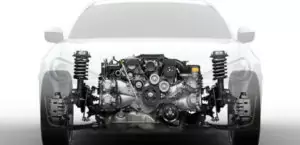The 1.0-liter gasoline engine Volkswagen AER 1.0 MPi was produced from 1996 to 1999 and was installed on a number of compact models of the concern, such as the Lupo, Polo, as well as the Seat Ibiza and Arosa. This power unit replaced the OHV motor under the AHT index, which was very outdated by that time.
The EA111-1.0 series includes: AER, AUC.
Specifications
| Production years | 1996-1999 |
| Displacement, cc | 999 |
| Fuel system | injector |
| Power output, hp | 50 |
| Torque output, Nm | 86 |
| Cylinder block | aluminum R4 |
| Block head | aluminum 8v |
| Cylinder bore, mm | 67.1 |
| Piston stroke, mm | 70.6 |
| Compression ratio | 10.5 |
| Features | SOHC |
| Hydraulic lifters | yes |
| Timing drive | belt |
| Phase regulator | no |
| Turbocharging | no |
| Recommended engine oil | 5W-30 |
| Engine oil capacity, liter | 3.2 |
| Fuel type | petrol |
| Euro standards | EURO 2 |
| Fuel consumption, L/100 km (for VW Polo 1998) — city — highway — combined |
7.8 4.9 5.9 |
| Engine lifespan, km | ~240 000 |
The engine was installed on:
- Seat Arosa 1 (6H) in 1997 – 1999;
- Seat Ibiza 2 (6K) in 1996 – 1999;
- Volkswagen Lupo 1 (6X) in 1998 – 1999;
- Volkswagen Polo 3 (6N) in 1996 – 1999.
Disadvantages of the VW AER engine
- This power unit is generally reliable, but regularly worries about trifles.
- Most failures are associated with the ignition system: candles, coil and high-voltage wires.
- The timing belt is designed for about 90 thousand km, and when it breaks, the valves always bend.
- Camshaft position sensor and antifreeze temperature sensor often fail.
- The crankcase ventilation system freezes in frost and squeezes oil through the dipstick.






